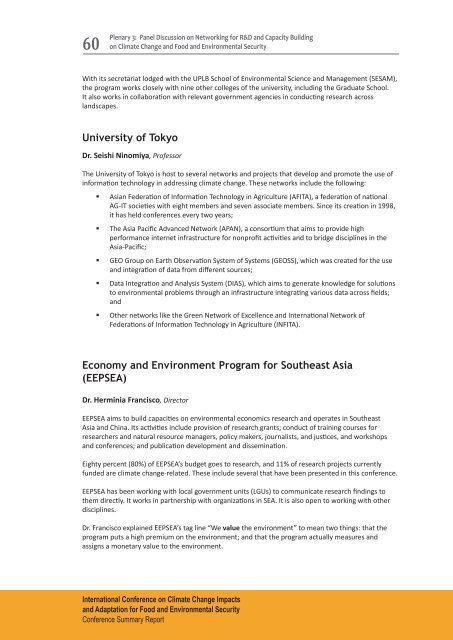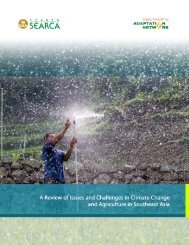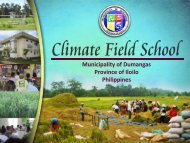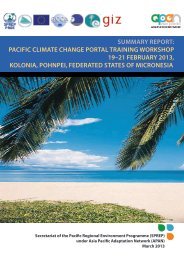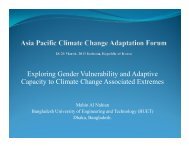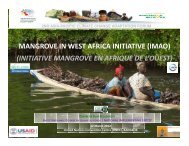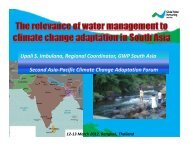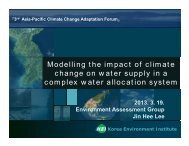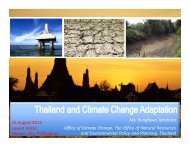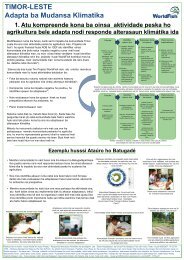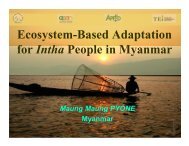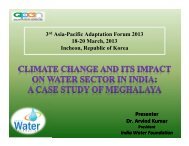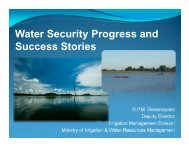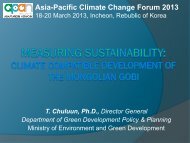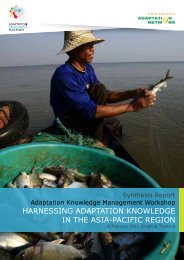PDF file (2.44 MB) - Asia Pacific Adaptation Network
PDF file (2.44 MB) - Asia Pacific Adaptation Network
PDF file (2.44 MB) - Asia Pacific Adaptation Network
Create successful ePaper yourself
Turn your PDF publications into a flip-book with our unique Google optimized e-Paper software.
60Plenary 3: Panel Discussion on <strong>Network</strong>ing for R&D and Capacity Buildingon Climate Change and Food and Environmental SecurityWith its secretariat lodged with the UPLB School of Environmental Science and Management (SESAM),the program works closely with nine other colleges of the university, including the Graduate School.It also works in collaboration with relevant government agencies in conducting research acrosslandscapes.University of TokyoDr. Seishi Ninomiya, ProfessorThe University of Tokyo is host to several networks and projects that develop and promote the use ofinformation technology in addressing climate change. These networks include the following:• <strong>Asia</strong>n Federation of Information Technology in Agriculture (AFITA), a federation of nationalAG-IT societies with eight members and seven associate members. Since its creation in 1998,it has held conferences every two years;• The <strong>Asia</strong> <strong>Pacific</strong> Advanced <strong>Network</strong> (APAN), a consortium that aims to provide highperformance internet infrastructure for nonprofit activities and to bridge disciplines in the<strong>Asia</strong>-<strong>Pacific</strong>;• GEO Group on Earth Observation System of Systems (GEOSS), which was created for the useand integration of data from different sources;• Data Integration and Analysis System (DIAS), which aims to generate knowledge for solutionsto environmental problems through an infrastructure integrating various data across fields;and• Other networks like the Green <strong>Network</strong> of Excellence and International <strong>Network</strong> ofFederations of Information Technology in Agriculture (INFITA).Economy and Environment Program for Southeast <strong>Asia</strong>(EEPSEA)Dr. Herminia Francisco, DirectorEEPSEA aims to build capacities on environmental economics research and operates in Southeast<strong>Asia</strong> and China. Its activities include provision of research grants; conduct of training courses forresearchers and natural resource managers, policy makers, journalists, and justices, and workshopsand conferences; and publication development and dissemination.Eighty percent (80%) of EEPSEA’s budget goes to research, and 11% of research projects currentlyfunded are climate change-related. These include several that have been presented in this conference.EEPSEA has been working with local government units (LGUs) to communicate research findings tothem directly. It works in partnership with organizations in SEA. It is also open to working with otherdisciplines.Dr. Francisco explained EEPSEA’s tag line “We value the environment” to mean two things: that theprogram puts a high premium on the environment; and that the program actually measures andassigns a monetary value to the environment.International Conference on Climate Change Impactsand <strong>Adaptation</strong> for Food and Environmental SecurityConference Summary Report


